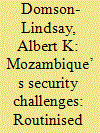| Srl | Item |
| 1 |
ID:
133232


|
|
|
|
|
| Publication |
2014.
|
| Summary/Abstract |
Attitudes to quangos are paradoxical. On the one hand they are perceived to be undemocratic, unaccountable organisations, while on the other they are seen to improve effectiveness, limit political interference and increase public confidence in government. This paradox is reflected in the behaviour of political parties, which generally adopt a harsh line towards quangos in opposition, but come to rely on these bodies in office. Ahead of the 2010 general election it was, however, noticeable that the Conservative party rejected this dynamic by promising to pursue 'a more sophisticated approach'. This article explores the Coalition government's subsequent 'public bodies reform programme', assessing its progress against recommendations contained within the Institute for Government's Read before Burning report of July 2010. It concludes that while the Coalition has addressed long-standing concerns about the day-to-day governance of public bodies, it has failed to resolve a set of broader and strategic (metagovernance) issues.
|
|
|
|
|
|
|
|
|
|
|
|
|
|
|
|
| 2 |
ID:
185508


|
|
|
|
|
| Summary/Abstract |
The ongoing security crisis in Mozambique reveals the limitations of the mainstream statist approach to security promotion. Whenever there is social conflict or unrest, state authorities instinctively and routinely rely on military means to deal with it. However, this approach disregards the root causes of the problem, which are often the internal social, political and economic triggers of insecurity. Presently there are international security actors assisting the Mozambican government in dealing with the armed conflict in their country. As a contribution to the emerging body of work on Mozambique’s security challenges beginning in 1990, this paper adopts a critical security perspective in the analysis of the problem. The view is taken that there ought to be a balanced or broader approach to security. Although a military response is necessary for combating hostile forces, this effort should go in tandem with addressing the fundamental causes of the crisis. The paper argues that in Mozambique poor governance in the form of corruption, political patronage, marginalisation of minority groups, centralisation of power and other exclusionary practices are the major sources of the country’s insecurity. Some proposals are suggested to address these challenges.
|
|
|
|
|
|
|
|
|
|
|
|
|
|
|
|